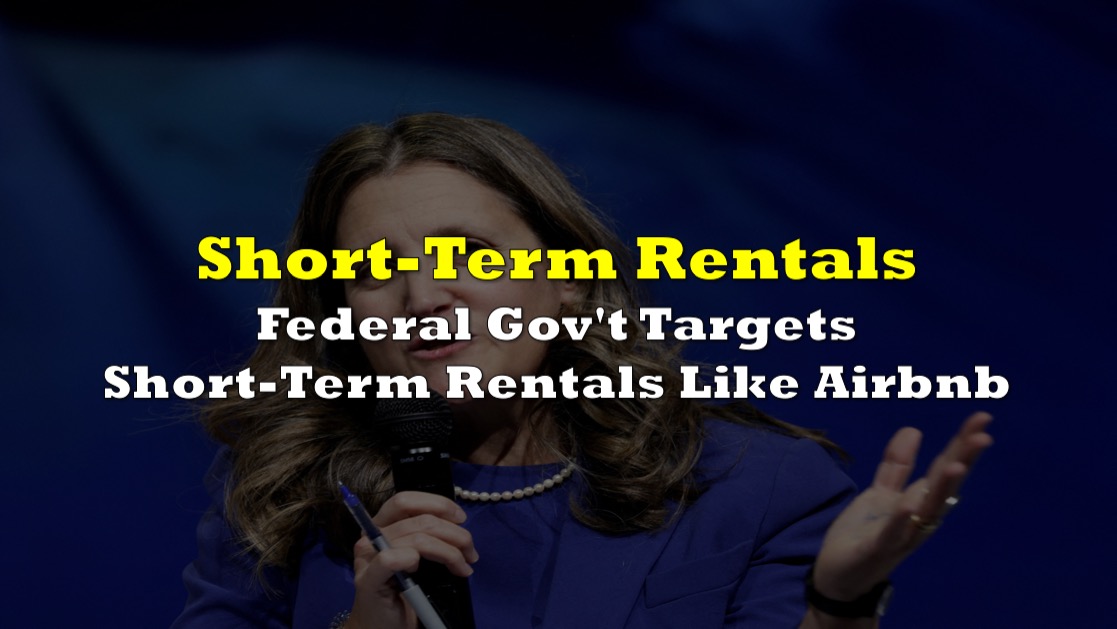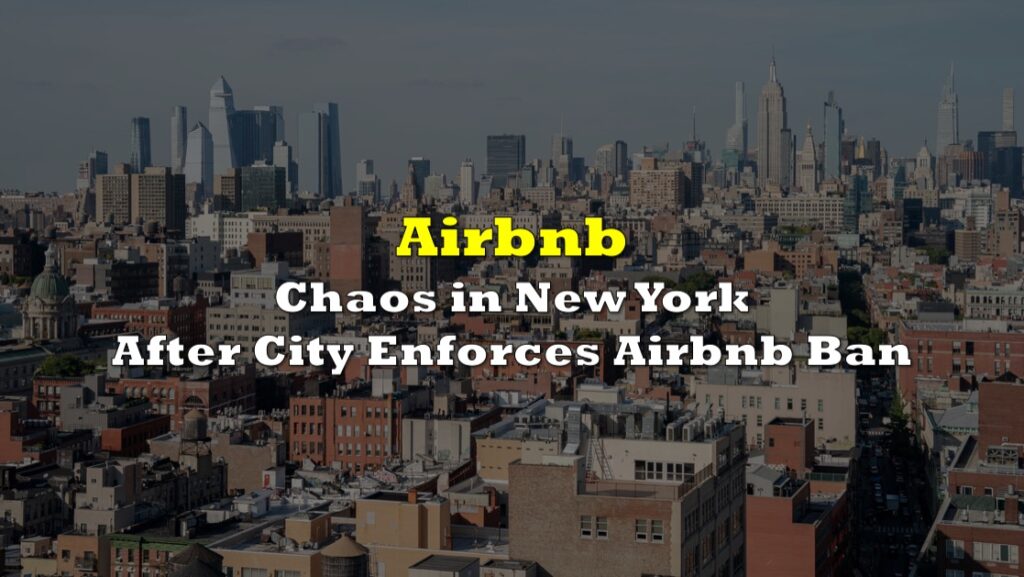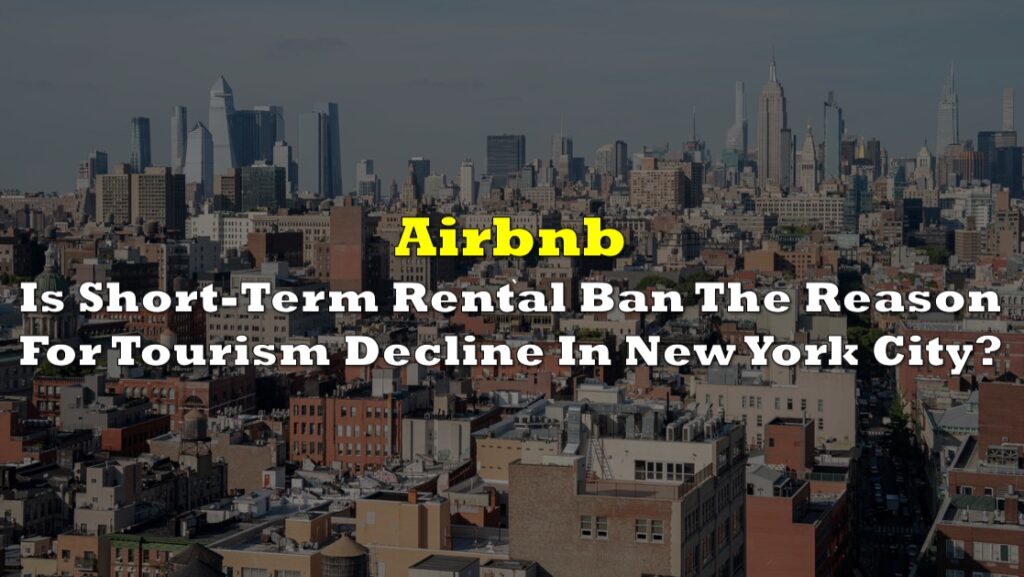The upcoming fall fiscal update by federal Finance Minister Chrystia Freeland is set to include a targeted measure aimed at reducing the appeal of using properties for short-term rentals, according to sources at the Star.
BOOM!! Federal Government Moves Against Airbnb!!
— Ron Butler (@ronmortgageguy) November 19, 2023
I rarely post on Sunday but this is news
The Federal Government will attack Short Term Rental through CRA @TorontoStar broke the story this morning
I knew the Feds were planning something since @cafreeland focused on it
2/
Property owners in areas already imposing restrictions on short-term rentals will no longer be allowed to claim rental expenses against their income, as disclosed by a senior federal official to the Star. This move aims to eliminate the incentive for individuals to circumvent local restrictions and list their properties on platforms like Airbnb.
“This is going to change the financial equation,” emphasized the official.
If this truly happens it will change the dynamic in the rental market huge.
— ac_eco (@ac_eco) November 19, 2023
Suddenly a flood of long term rentals will become available and will put downward pressure on rents.
This will exacerbate already compressed cap rates in a high mortgage rate world https://t.co/B66b0RRgSP
This development coincides with increasing calls for the federal government to take more substantial action to bolster Canada’s housing supply. In September, the Canada Mortgage and Housing Corporation highlighted the need for an additional 3.5 million housing units within the next decade to enhance affordability. Pressure on the government has intensified due to stories of individuals forced out of their homes, families cramped in small rentals, and overcrowded shelters.
Despite housing being primarily under the jurisdiction of provincial and municipal governments, the Liberals have recently announced significant spending on housing initiatives. In the upcoming fall financial update, alongside additional funds for new construction, the government aims to ensure that existing homes contribute to alleviating the current housing challenges in Canada.
The federal approach to short-term rentals varies across provinces and cities, and the government anticipates that the new measure will encourage more municipalities to adopt restrictions. The tax change is slated to take effect on January 1, 2024. The fall economic statement will also allocate funds to assist municipalities in enforcing existing rules.
While the official did not disclose the specific amount of additional funding for housing, they emphasized that the economic statement, scheduled for release on Tuesday, should not be viewed as a comprehensive budget but as a mid-year fiscal update on existing promises and priorities.
“It’s not a 10-chapter book of initiatives on all fronts,” clarified the anonymous official.
In addition to housing updates, the fall economic statement will report progress on clean-technology investment promises and the government’s intentions to strengthen competition laws. Amendments to existing legislation will also be announced to address concerns related to price fixing.
The New Democratic Party, supporting the minority Liberal government, has been advocating for tougher competition laws, a demand likely to be addressed in the upcoming statement. The Opposition Conservatives, on the other hand, have been urging fiscal restraint, attributing inflation to the government’s previous spending programs.
Responding to calls for restraint, the official stated that the fall economic statement will be “narrow” and selective in addressing measures given the current economic climate. With softer economic growth predicted for Canada and interest rates expected to remain high, the government aims to avoid exacerbating the situation with excessive spending.
Freeland had previously signaled the government’s intention to address the short-term rental market following B.C.’s announcement of legislation strengthening restrictions on property rentals. The Minister emphasized the need to convert short-term rentals into long-term options to free up housing units.
BC Premier David Eby and Housing Minister Ravi Kahlon unveiled the Short-Term Accommodations Act earlier this month. The new legislation regarding short-term rentals is set to implement stricter measures, significantly increasing fines for rule-breaking hosts and introducing new requirements for operators with the goal of bringing more units into the long-term housing market.
The recent provincial announcement outlined new rules, permitting rentals on platforms like Airbnb and VRBO only if the property owner resides on-site, such as in a basement suite or laneway home. Resort towns, hotels, and First Nations reserves will be exempt from these requirements, with an enforcement unit, heftier fines, and a registry set to be established by late 2024 for non-exempt areas.
Nathan Rotman, the regional policy director for Airbnb Canada, expressed surprise at the new regulations after discussions with government officials. He found the “one-size-fits-all” legislation to be surprising due to the amount of regulation and the extended definition of “short term.” Rotman also expressed concerns about the impact on hosts who rent out their primary residences and the potential complications arising from the need to obtain both Vancouver and provincial licenses.
Rotman emphasized that reducing the number of Airbnb hosts would not necessarily create more affordable housing and could adversely affect workers in need of temporary accommodation. He noted that the 90-day definition of “short-term rental” in B.C. differs significantly from other jurisdictions, where it is typically set at 30 days.
A 2019 Statistics Canada study estimated the revenue from short-term rentals at $2.8 billion in 2018, a figure that has likely increased since then, partly due to the pandemic and rising living costs prompting more individuals to rent out their homes.
Information for this briefing was found via Toronto Star and the sources mentioned. The author has no securities or affiliations related to this organization. Not a recommendation to buy or sell. Always do additional research and consult a professional before purchasing a security. The author holds no licenses.









